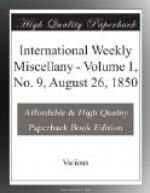“A similar melancholy narrative applies to another great Yorkshire house. Sir William Reresby, Bart., son and heir of the celebrated author, succeeded, at the death of his father, in 1689, to the beautiful estate of Thrybergh, in Yorkshire, where his ancestors had been seated uninterruptedly from the time of the Conquest; and he lived to see himself denuded of every acre of his broad lands. Le Neve states, in his MSS. preserved in the Heralds’ College, that he became a tapster in the King’s Bench Prison, and was tried and imprisoned for cheating in 1711. He was alive in 1727, when Wootton’s account of the Baronets was published. In that work he is said to be reduced to a low condition. At length he died in great obscurity, a melancholy instance how low pursuits and base pleasures may sully the noblest name, and waste an estate gathered with labor and preserved by the care of a race of distinguished progenitors. Gaming was amongst Sir William’s follies—particularly that lowest specimen of the folly, the fights of game-cocks. The tradition at Thrybergh is (for his name is not quite forgotten) that the fine estate of Dennaby was staked and lost on a single main. Sir William Reresby was not the only baronet who disgraced his order at that period. In 1722, Sir Charles Burton was tried at the Old Bailey for stealing a seal; pleaded poverty, but was found guilty, and sentenced to transportation; which sentence was afterward commuted for a milder punishment.”
* * * * *
MADRID AND THE SPANISH SENATE.
Gazpacho; or, Summer Months in Spain, is the title of a new book by W. George Clark, published in London. Gazpacho, it seems, is the name of a dish peculiar to Spain, but of universal use there, a sort of cold soup, made up of familiars and handy things, as bread, pot-herbs, oil, and water. “My Gazpacho,” says the author, “has been prepared after a similar receipt. I know not how it will please the more refined and fastidious palates to which it will be submitted; indeed, amid the multitude of dainties wherewith the table is loaded, it may well remain untasted.” It at least deserves a better fate than that. The volume relates, in a pleasant, intelligent, and gossiping way, a summer’s ramble through Spain, describing with considerable force the peculiarities of its people, and the romantic features by which it is marked. The clever painter could not have better materials. The party-colored costumes of the peasants, like dahlias at a Chiswick show; the somber garments of the priests, the fine old churches, the queer rambling houses, looking centuries old, the dull, gloomy streets of Madrid, the life and activity of the market-place. Such are the objects upon which the eye rests, and of which Mr. Clark was too observant to neglect any. The following passages will give an idea of the materials of which the Gazpacho is made up:—




